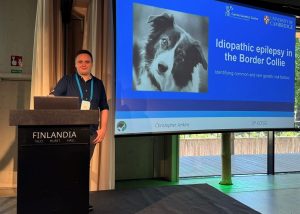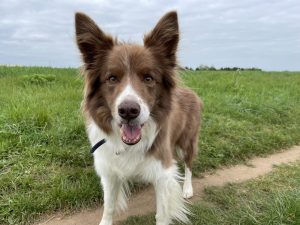 This week we turn our attention to canine genetics researcher and Border Collie enthusiast Dr Chris Jenkins. Chris has worked with the CGC since the team moved to Cambridge in 2021, and before then with the same group when based at the Animal Health Trust in Suffolk. We talked to Chris about his work, and learned about how his favourite dog breed may have influenced his career choices.
This week we turn our attention to canine genetics researcher and Border Collie enthusiast Dr Chris Jenkins. Chris has worked with the CGC since the team moved to Cambridge in 2021, and before then with the same group when based at the Animal Health Trust in Suffolk. We talked to Chris about his work, and learned about how his favourite dog breed may have influenced his career choices.
“My family has always had Border Collies, and I am the proud owner of Ed, a red and white Border Collie who is brilliantly clever and a tennis ball fanatic. I care deeply about animal welfare and have a background in molecular biology and genetics, so I was excited by the opportunity to combine my interests when I joined the canine genetics group in 2014 at the Animal Health Trust. I started as a research assistant, working on a broad range of projects, then in 2016 I seized the chance to study for a PhD, registered at the University of Manchester, while continuing to work as a research assistant within the group.”
 Chris’s PhD looked at neurological diseases, including idiopathic epilepsy in Border Collies and Italian Spinone, cerebellar ataxia in Norwegian Buhunds, and paroxysmal dyskinesia in Norwich Terriers. “Through my PhD research I gained a strong interest in using computational approaches and large datasets to study genetic disease,” Chris commented.
Chris’s PhD looked at neurological diseases, including idiopathic epilepsy in Border Collies and Italian Spinone, cerebellar ataxia in Norwegian Buhunds, and paroxysmal dyskinesia in Norwich Terriers. “Through my PhD research I gained a strong interest in using computational approaches and large datasets to study genetic disease,” Chris commented.
Since graduating with his PhD last year, Chris’s research has continued to focus on epilepsy, one of the most common chronic neurological diseases in dogs. “Epilepsy can have a major impact on dog welfare and be extremely distressing for owners,” said Chris. “I am currently working on a PetPlan Charitable Trust funded project, on a grant awarded to Dr Sally Ricketts, which has expanded the group’s idiopathic epilepsy research to include Beagles, English Springer Spaniels, Giant Schnauzers, Hungarian Vizslas, and Irish Setters.”
Along with Sally and study coordinator Jim Johnson, Chris works with vets and researchers throughout the world, including at The Queen’s Veterinary School Hospital based here at the University of Cambridge, Linnaeus, the Royal Veterinary College, and University of Manchester in the UK, as well as the University of Helsinki and Utrecht University. “This collaborative approach is important for diseases such as epilepsy which are likely to have a complex mode of inheritance and therefore require large sets of DNA samples to help tease apart the genetics underlying the disease,” said Chris. “We are very grateful to the many dog owners and breed communities for their huge support for our research, both in terms of sample collection and funding initiatives.”

